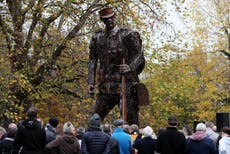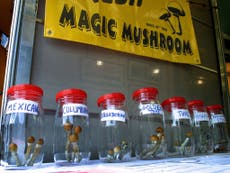As a veteran with PTSD, cannabis helps me fight for myself in ways other treatments fail to
Society’s current approach is to treat the symptoms, not the patient. Healing the entire person takes a whole lot more than that

Post-traumatic stress is not permanent. I know that statement probably makes a lot of people uncomfortable, with arguments of “you don’t know me or what I’ve been through” often ringing out.
You’re right, I don’t know you or your experiences. However, I am aware of my own, and I know the physiology of the brain doesn’t always stay the same – our habits are formed and reformed as we live our lives.
Post-traumatic stress disorder, or PTSD, does not have to be a permanent condition. In reality, it should be called “post-traumatic stress injury”.
Here’s how I look at it: a traumatic experience happens and creates a sense of hopelessness or helplessness, immediately initiating the fight-or-flight response. This then hardwires the brain to immediately repeat those feelings of hopelessness and helplessness, triggering fight-or-flight as soon as any external stimulus reminds the brain of the trauma.
In so many ways it’s no different than tying your shoes without a thought. The habit becomes so ingrained in the physical make-up of our neuropathways that we almost have zero higher brain function to respond to the stimulus.
Again, I’m not a neuroscientist, doctor, or any other form of highly trained medical professional – these are just the words of a knuckle-dragger. A knuckle-dragger who, in 2016, got so lost in his own battles that he ended up on a couch in Lancaster, Kentucky, writing his suicide note after drinking every ounce of alcohol in the house.
And yet I am still here to write this to you.
My introduction to cannabis came in 2015. I found that using a little bit helped a lot. It helped me sleep, feel less anxious, and ultimately just feel better all round. So how did I go from finding something that helped to nearly taking my own life?
The answer is that when I decided to get out of the military, I moved to a state where cannabis and hemp were still illegal, cutting off my access to them. Now, I am fighting for other veterans and first responders to have access to these compounds through the US Department of Veterans Affairs (VA).
The current method of treating PTSD is to medicate the symptoms, not to actually treat the patient. In fact, many of the medications prescribed do the opposite and suppress the brain’s natural healing functions.
Because of this, many PTSD sufferers are stuck in a cycle: take pills, feel sedated, stop taking pills, then feel alive until the massive hammer of symptoms comes back. This is why we see so many veterans taking their own lives – not to mention the number of first responders who are suffering and who rarely get discussed.
There are far better ways to treat these symptoms while also treating the entire patient. Holistic methods like meditation, direct exposure to the sun, physical fitness, regular routines, infrared light therapy and, of course, cannabis.
The problem with treating PTSD and the symptoms that come with it is that modern society wants a pill to fix everything. You want to know how to get better? Here’s the secret: stop living miserably and choose to change how you live your life. If you don’t like pills, then figure out other means of treatment.
Seek other professionals to help you find other answers. Stop expecting the answer to magically appear one day, and start seeking knowledge on your own to help you change the status quo.
It wasn’t until 2018-2019 that I was able to start using cannabidiol (CBD) again. This means that from January 2016, when I first attempted suicide, until December 2018, I had to figure out other ways of dealing with all my symptoms.
I refused to go to the VA for fear that the entire process would eat up all of my time, only to have them tell me I was broken and give me pills. I didn’t want that. So I used other methods of treatment.
I meditated, started blacksmithing to make custom knives, and chose to define my purpose by connecting with other veterans from the Special Operations community. I connected with myself, found a tribe, and defined my purpose.
I am not here to tell you that cannabis is the magic pill we are all looking for. It will not fix you. It will not magically heal all your ailments. But I will tell you this: while CBD continues to help me with my anxiety, sleep, aches and pains and racing mind, it hasn’t fixed me; I had to choose to change. What CBD has done, however, is help me to fight all the things that blocked me from making those adjustments happen.





Join our commenting forum
Join thought-provoking conversations, follow other Independent readers and see their replies